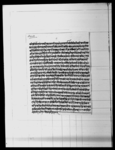A report from Balabhadra to Kājī Abhimāna Siṁha Rānā on his activities in Udayapur (VS 1900)
ID: DNA_0003_0010
Edited and
translated by Simon Cubelic
in collaboration with
Manik Bajracharya and Pabitra Bajracharya
Created: 2019-04-29;
Last modified: 2022-11-30
For the metadata of the document, click here
The accompanying edition, translation/synopsis and/or commentary are available under the terms of the Creative Commons Attribution-ShareAlike 4.0 International License
Abstract
In this letter Balabhadra reports from Udayapur to Kājī Abhimāna Siṁha Rānā about the reception of military equipment, the escape of Jaya Kṛṣṇa Āle, pecuniary difficulties in meeting the expenses arising from his jāgira assignment, tiger attacks and issues with a standard required for military drills.Diplomatic edition
[1r]
1नं२४३1स्वस्तिश्रीसर्वोपमायोग्यत्यादिसकलगुणगरिष्टराजभारोद्धरणसामर्थश्रीश्रीश्रीकाजिअभिमानसिंराना2महासयषुइतश्रीवलभद्रज्यूकोसलामसतंपुर्वकपत्रेत्यादिइतनिकतांहांकुसलभयाहाम्रोउद्दारहोला
3आगेईहाकोसमाचारभलोछउप्रान्त∙वैसाषका२८दिनजादाउदैपुरगढिआई∙पुगि∙नालनिसान∙
4वुझिषर∙षजानावुझैदैथिञ्यु∙जगेरावुज्याकोथियेन∙तस्तैविचमाकुम्मेद्दानजैकृस्नआलेलाई∙लिन∙
5सर्दारकर्णसिंवोगटिमार्फत्सिपाहिआयाछंर∙सिपाहिआयाकोषवर∙विचैवाटथाहापायेछर∙जयकृ
6स्नआलेभागिजंगलपसिरहेछ∙षोजगर्नालाई∙पट्टिपठायाकोछ∙पकृयोभन्यापठाउन्याकामगरौ
7लाजगाकोजाचवुझ∙गर्नलागिरह्याछौ∙ञाहाकाजगाकोउठतिपैदावारजोठहर्ला∙सोविन्ति∙गरिपठाउ
8ला∙सयनालकाजगादुइसैनालवुझाउनपरिरहेछ∙मेरोवोलविन्ति∙गरिनिकासिगरि∙दिन्यामानिसअ
9र्कोकोहिछैन∙योजागिरपनि∙ताहिका∙मेहरलेभयाकोहो∙अवपनिसवैवात्कोसम्भारताहिवाटराषिदि
10नुभयामेरोउद्दारहुन्याछ∙जगेराकोमोहरकोर∙मेराजागिरकापट्टाकोव्येहोराविन्तिगरिचरणमासुवे
11दारलाई∙छोडि∙आञाथ्याँ∙आजसम्मकेहीनिस्तुकआयेन∙मेराजागीर्कोभरनाजगार∙दसैकोमामुलि
12षर्च∙सातपगरिकातोसपगरिकोतनुषाँकोचाडैठेगानावाधि∙पठाई∙दिनुभयावढियाहोला∙ताहावाट
13मपरनिघारहेनभन्यामेरोकेहिचल्न्याछैन∙सवैवात्कोसम्झनाराषि∙विन्तिगर्याका∙कामकोठेगाना∙
14वाधि∙पठाइदियाजाव़ोस्∙पोरकासालदेषिषुजपट्टिवाघले∙ढेरैविद्युतगर्नलागेछ∙ञाहाकाथानी
15थरिभैवादगर्न्याधामिझिकाई∙सोद्धाञांहांकादेउतालाई∙विसासैवलिनदियाकोढेरैवर्षभयोयेसैअ
16र्थले∙विद्युतभयाकोहोभन्छन्∙वघाइभयोभन्याषुजकोवस्तिऊजार∙हुन्याछ∙षर्चवर्चगरौभन्यापनी
17कम्पनिकोपेटकेहिछैन∙यस्कुराकोपनितनुषाभई∙आयाआजापुजागर्नलाउदाहुँनिसानकाठ्फर्द
18गेरुरंकाकपडा∙सवुजि∙सन्जापरहेछ∙फर्दफाटिडाठमात्रैछंफर्दनफेरि∙निसानषोल्न∙पनिभये
19नफर्दफेर्न्याकपडारअरुसन्जापकोचिउलिषर्चवर्चस्मेत्∙पठाईदिनुभया∙फर्दफेर्न्याकाम्
20गरि∙कम्पनिकासिपाहिलाईकवायेतमासघाऊन्याकाम्गरौला∙वहुतकाहातकलेषु∙चरणकाकु
21सलछेमसहितसिक्षार्तिपत्रकृपाभयाजाव़ोस्विज्ञेषुकिमधिकम्∙इतिसम्वत्१९००सालमिति
22ज्येष्टवदि१४रोज७मोकाम्उदैपुरसुभम्¯¯¯ ¯¯¯ ¯¯¯ ¯¯¯ ¯¯¯ ¯¯¯ ¯¯¯ ¯¯¯
Translation
[1r]
Number 2431
Hail! This is a letter preceded by a hundred salutations from here from the venerable Balabhadra to the munificent thrice venerable KājiAbhimāna Siṃ Rānā who is worthy of all [laudatory] comparison etc., possessed of all virtues in the highest degree and able to bear the king's burdens...
If your health there is good, it will be our salvation. Āge: The tidings here are good. Uprānta: Leaving on the 28th day of Vaiśākha, we arrived at the fort of Udaipur. Having received gun barrels and standards, we were in the process of receiving ammunition. We had not yet received additional [supplies] when soldiers (sipāhī) [sent] by Sardāra Karṇa Siṃ Bogaṭi arrived in order to seize hold of Commandant Jaya Kṛṣṇa Āle (text: Jai Kṛsna Āle). Jaya Kṛṣṇa Āle (text: Jaya Kṛsna Āle) in the meantime received the news that the soldiers had arrived, and he fled into the forest. A squad (paṭṭi) was dispatched to search for him. If he is arrested, we will transfer [him to you].
We have started to inspect the land. We will determine the revenue from the land there and its fertility and will inform you about it in writing. For land for which [previously] a tribute (nāla) of one hundred [had to be submitted], two hundred is now required. There is no other person [than you] whom I can call on to show me a way out. This jāgira, too, became [mine] by your mercy. If you now could take care of all matters, it would be my salvation. I have left with the subedāra the details of the mohara for my jagerā [land] and the lease deed (paṭṭā) for my jāgira addressed to you. Until now no decision has arrived [from you]. It would be good if you could quickly send the orders for the land substituting for my jāgira, the usual dasaĩ māmulī allowance [and] the salary for [the posts of] sāta pagarī and tosa pagarī2 . If I receive no kindness from you, I will be helpless. May you recall to mind all these matters, decide upon what I have requested and send [the aforementioned remuneration].
Since last year tigers have been creating a lot of mischief in the valley. A shaman (dhāmī)3 who gives advice was called upon and consulted by the local thānīs and tharīs. He said that for many years the bisāsai4 sacrifice had not been offered to the local deity. That is why there has been [this] mischief. If there are tiger attacks, the settlements in the valley will be abandoned. Even if we are thinking of covering the expenses [for the sacrifice], the kampanī has no opinion (peṭa) about it. If an allowance is forthcoming also for this matter, I will see to it that the worship is carried out.
The standard [consists of] a wooden [pole] [and] a flag (pharda) of red-brown cloth with a green fringe. The flag has torn off and only the pole remains. Unfurling the flag cannot be done without replacing the flag. If you send the expenses for changing the cloth for the flag and for the other [materials] including the ciuli cloth for the fringe, I will replace the flag and assist (saghāunu)5 the soldiers of the kampanī with the drills.
What more can I write? May a letter with [confirmation of] your welfare and health, and [with] instructions be kindly sent to me. What more [to write] to one who is knowledgeable? Saturday, the 14th of the dark fortnight of Jyeṣṭha in the [Vikrama] era year 1900 (1843 CE). Residence: Udayapur. Auspiciousness.
Commentary
The author of this report cannot be identified with certainty. M. C. Regmi mentions a certain Balabhadra (the son of KharadāraViṣṇu Śaṅkara) who was part of a diplomatic mission to China in 1849 (Regmi 1970, 204). Since the events recorded in this document and the mission are only separated by a few years, they might be the same person. This document adds to the material on Udayapur district for the years 1842–1843 assembled in Krauskopff and Meyer 2000, 138–141 (Document 20-22).

